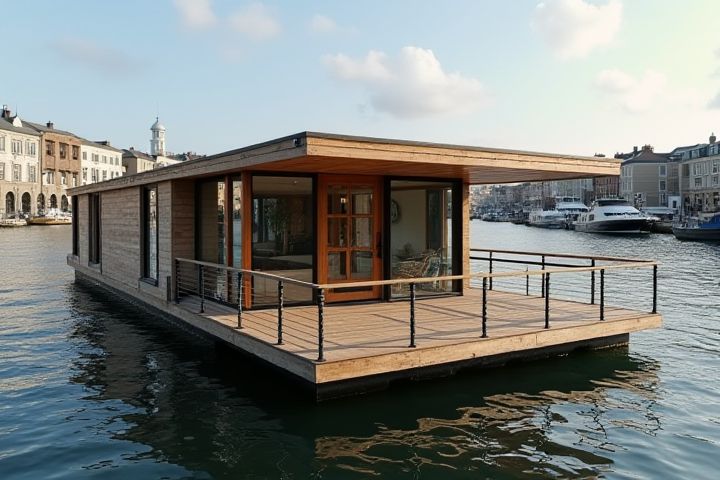
A houseboat can serve as a permanent residence if it meets specific requirements such as adequate space, amenities, and stability. Many modern houseboats are designed with full kitchens, bathrooms, and sleeping areas, providing the essentials needed for daily living. Local regulations and marina guidelines play a crucial role in determining the feasibility of using a houseboat as a permanent dwelling, including zoning laws and compliance with safety standards. It's essential to consider factors such as access to utilities, maintenance, and potential environmental impacts when deciding to live on a houseboat year-round. Living on a houseboat can offer a unique lifestyle and picturesque views, making it an appealing option for those seeking a boating lifestyle.
Can A Houseboat Be A Permanent House
Zoning regulations
Zoning regulations vary significantly by location, impacting whether a houseboat can serve as a permanent residence. Many municipalities require living arrangements on watercraft to conform to specific criteria, such as minimum dimensions, sanitation facilities, and mooring permits. Some regions may restrict houseboat living to designated areas, while others may enforce time limits on stays, prohibiting year-round habitation. It is essential to consult local zoning laws and agency guidelines to ensure compliance and avoid potential fines or displacement.
Permits and licenses
Owning a houseboat as a permanent residence may require specific permits and licenses that vary by location. Many jurisdictions mandate a liveaboard permit, which confirms that you are authorized to reside on your vessel. Furthermore, you'll need to comply with local zoning regulations and health codes, ensuring that your houseboat meets safety and sanitation standards. Always check with local authorities to obtain the necessary documentation, as failure to do so can result in fines or eviction from mooring locations.
Mooring costs
A houseboat can indeed serve as a permanent residence, but it's essential to consider mooring costs, which can vary significantly based on location and amenities. In urban areas with high demand, mooring fees can be steep, often ranging from $300 to over $1,500 monthly. Additionally, some marinas charge extra for utilities, such as electricity and water, contributing to your overall living expenses. When budgeting for your houseboat lifestyle, be sure to factor in these recurring costs to ensure it fits within your financial plan.
Utility connections
A houseboat can serve as a permanent residence if it is equipped with essential utility connections, including water, electricity, and sewage systems. Many houseboat communities provide direct links to municipal services, allowing residents to enjoy regular access to these utilities. Alternatively, some boat owners opt for self-sufficient systems, like solar panels for electricity and composting toilets, to ensure continuous utility supply. Understanding the local regulations regarding permanent residency on a houseboat is crucial for enjoying long-term living in this unique setting.
Maintenance requirements
A houseboat can certainly serve as a permanent residence, but it requires consistent maintenance to ensure safety and livability. Regular inspections of the hull are essential to prevent water damage and maintain structural integrity, while the plumbing and electrical systems demand routine checks to avoid leaks and malfunctions. You should also prioritize cleaning and treating the exterior to combat potential mold and algae growth caused by prolonged exposure to water. Investing in quality materials and applying protective coatings can greatly extend the lifespan of your houseboat, enhancing your long-term living experience.
Insurance policies
Houseboats can serve as permanent residences, but it's essential to consider specific insurance policies tailored for watercraft. Standard homeowners insurance typically does not cover houseboats; instead, you should explore specialized boat insurance that includes liability and personal property protection. Policies for houseboats often vary based on factors like size, type, and location, making it crucial to consult with insurance providers to ensure you have adequate coverage. Your houseboat may also require additional endorsements for unique circumstances, such as mooring or living aboard full-time, so thorough research and discussion with an insurance agent is vital.
Mail delivery options
Houseboats can serve as permanent residences, but mail delivery options may vary significantly based on location. In many areas, postal services like USPS, UPS, or FedEx can deliver directly to docks, provided you have a designated address or mailbox set up on land. Some floating communities offer centralized mail services, where mail is collected at a communal dock. However, you should verify specific delivery services in your area to ensure reliable and consistent mail receipt.
Safety standards
A houseboat can serve as a permanent residence, provided it meets specific safety standards and regulations. According to the U.S. Coast Guard, houseboats must adhere to regulations regarding fire safety, electrical systems, and structural integrity. For instance, ensuring proper installation of smoke detectors and fire extinguishers can significantly enhance safety for occupants. Additionally, obtaining a marine survey can help identify potential hazards, ensuring your houseboat remains a safe living environment.
Environmental impact
A houseboat can serve as a permanent residence, offering unique environmental advantages. Typically constructed from sustainable materials, many modern houseboats utilize solar panels for energy, reducing reliance on fossil fuels. According to studies, this lifestyle can lead to a significant decrease in the carbon footprint, with some estimates showing a reduction of up to 50% compared to traditional homes. You may also find that living on water reduces land use and preserves green spaces, promoting a more sustainable living environment.
Legal status
A houseboat can serve as a permanent residence, but its legal status varies significantly based on location and local regulations. In many areas, houseboats must comply with specific zoning laws, which dictate where they can be docked and if they can be lived in full-time. Some jurisdictions require houseboats to be registered as vessels, while others may classify them as dwellings, leading to different tax implications and requirements for utilities and sanitation. To ensure compliance and clarify its legal status, you should consult local laws and possibly obtain permits before making a houseboat your permanent home.
